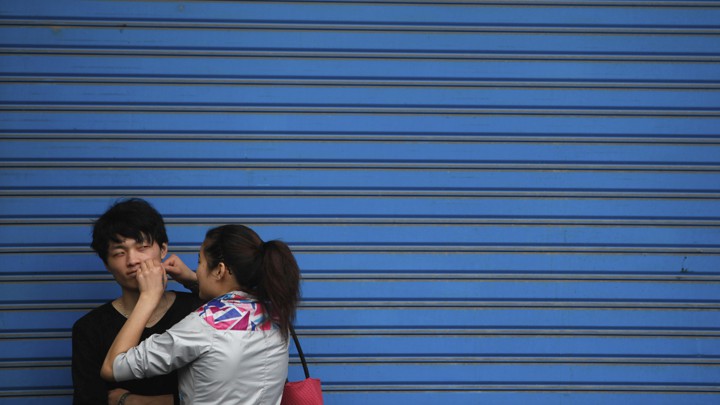Dermatologists Are a 'Little Bit Tired' of Flawed Acne Treatments There are dozens, if not hundreds, of theories on preventing and...

There are dozens, if not hundreds, of theories on preventing and treating acne. Some people swear by supplements. Others sing the gospel of giving up dairy or even drinking dog pee in order to eliminate the pesky (and sometimes painful) bumps. But even the best, most scientifically backed treatments can cause problems, like dry skin, sensitivity to sunlight, and birth defects.
These imperfect remedies make it particularly exciting that there’s a new acne vaccine in development. But even that, as promising as it is, may fall prey to many of the same pitfalls as current treatments.
The vaccine, which if put into use would be the first of its kind, is designed to reduce the body’s inflammatory re sponse to the toxins secreted by bacteria in the skin. So far the vaccine has only been tested in mice and human-tissue samples, but “the potential impact of our findings is huge for the hundreds of millions of individuals suffering from acne,†said Chun-Ming Huang, one of the lead researchers working on the vaccine, in a press release. (Huang and his team did not respond to requests for interviews.)
The bacteria targeted by the new vaccine are just one potential cause of acne; hormones, genetics, and certain medications can also contribute to the condition. Carlos Charles, the founder of Derma di Colore, a dermatology practice that specializes in skin of color, says that the multifactorial nature of acne makes it very difficult to treat. “People often come in and say, ‘Is it my diet?’ and I say yes. ‘Is it the cream I’m putting on my face?’ I say yes.â€
Charles often prescribes isotretinoin, an oral medication commonly known as Accutane (tho ugh that brand is no longer distributed) that falls under a class of treatments called retinoids. It’s one of the best available treatments for acne. But it’s far from perfect: It can be incredibly drying, and risks causing such severe birth defects that female patients who take it are required to prove that they’re on two forms of birth control or abstaining from sex with men.
The scorched-earth acne solution
“Accutane is my bread and butter,†says Charles. “But it has to be administered carefully, preferably by a board-certified dermatologist.â€
Adelaide Hebert, a professor of dermatology at McGovern Medical School at UTHealth in Houston, says providers sometimes prescribe the blood-pressure-regulating drug spironolactone to treat acne. And dermatologists often recommend less invasive (and often less effective) methods like topical retinoids, antibiotics, birth control, and over-the-counter products with salicylic acid or benzoyl peroxide. Most of th ese treatments target just one potential cause of acne: For bacterial acne, there’s antibiotics. For hormonal acne, there’s birth control. Few address both, along with the myriad other factors, from pore-clogging makeup to time spent wearing a helmet, that contribute to acne.
While the acne vaccine in development is, according to Charles, “really promising,†it, too, has a narrow focus: the inflammatory response to skin bacteria. Emmanuel Contassot, a senior assistant at the University Hospital and Faculty of Medicine of the University of Zürich and the author of a commentary responding to the vaccine research, says that there’s reason to be hopeful regarding the new vaccine, but that it will potentially come with side effects of its own. “Targeting P. acnes [the bacteria most often associated with acne] with a vaccine would be more specific and less toxic than chemical therapies,†he says. But not all P. acnes bacteria is bad, he notes; it’s made up of different strains, and while some cause acne, others are beneficial. If it targets the wrong strains, the vaccine “might worsen patients’ condition by disturbing skin integrity,†Contassot says.
Charles says he imagines the vaccine would be best employed alongside other, more established acne treatments. “I wouldn't envision it being a single agent but it may help to pare down some of the other things that we do,†he says.
Other emergent acne therapies have also shown promising results in the last couple decades. One such method uses probiotics, which, according to Jennifer Chwalek, a dermatologist at Union Square Laser Dermatology, may help lessen acne in some patients. “One of the most interesting ideas is targeting the gut/skin microbiome dysfunction,†she says. Some studies have found that applying a particular bacterium may have anti-inflammatory and bacteria-killing effects.
Will probiotics ever live up to the hype?< /p>
Lasers are also increasingly used to treat acne, though the American Academy of Dermatology notes that they’re time-intensive and the results are unpredictable. And they come with their own host of potential side effects, including swelling, redness, and even burns.
Despite the possible downsides, Charles says he’s excited about the vaccine. “We haven’t had a novel treatment for acne in a long time,†he says. “As dermatologists and patients alike, we’re all a little bit tired of what we have.â€
We want to hear what you think about this article. Submit a letter to the editor or write to letters@theatlantic.com.
Angela Lashbrook is a writer based in New York.Source: Google News US Health | Netizen 24 United States




No comments